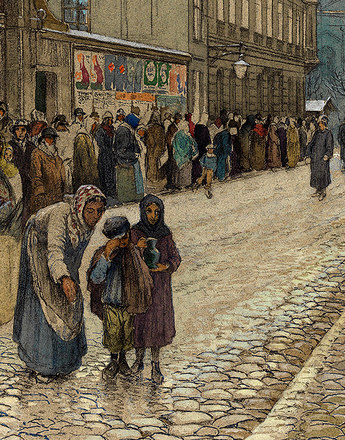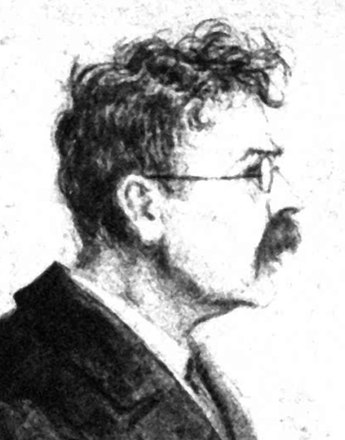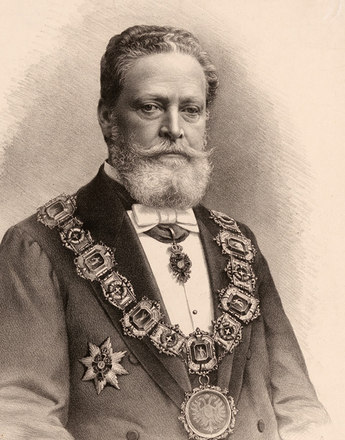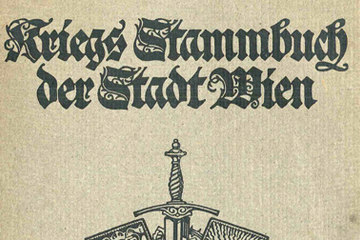The political system: The “Obmänner”conference and the municipal council
-

Caricature on the dispute between the Mayor of Vienna Weisskirchner and the Social Democrats, from Der Morgen, issue of 25 September 1916
Copyright: Wienbibliothek im Rathaus
Partner: Wienbibliothek im Rathaus – Vienna Library in the City Hall -

Caricature of the dispute between the Mayor of Vienna Weisskirchner and Jakob Reimann
Copyright: Wienbibliothek im Rathaus
Partner: Wienbibliothek im Rathaus – Vienna Library in the City Hall
According to the Viennese constitution this institution of the “Obmännerkonferenz” – “conference of chairmen” – did not exist. But it proved to be a cunning strategic instrument for Mayor Weiskirchner; it provided for “Burgfrieden” – a political truce among the parties – and secured continuity in politics and administration even after the collapse of the monarchy.
By establishing the so-called “Obmännerkonferenz” – conference of chairmen – first convening on 28 July 1914, into which he integrated all parties including the Social Democrat opposition, Vienna’s Christian Social mayor Richard Weiskirchner accomplished a political coup which – despite all conflicts in the years between 1916 and 1918 – was effective throughout the war (and beyond the founding of the Republic). He made no further comment on the fact that the Social Democrats kept themselves aloof at the extraordinary session of the municipal council at the start of the war “in consideration of their principle opposition to the war”. At the same time, he ensured that the latter contributed to “necessary measures of the municipal corporation” during the war and that they were present during collective public acts of the City of Vienna in confrontation with the Lower Austrian provincial authorities and government. The municipal council remained powerless until 1916; even after this, principal debates were conducted in the Obmännerkonferenz, and it was here that decisions were made. The institution of the Obmännerkonferenz – in no way provided for in the constitution – unburdened the load on the mayor’s shoulders and conceded the opposition rights of cooperation and control. Admittedly, Weiskirchner saw himself increasingly confronted during the war with the ever more vehement demand of the Social Democrats for the end of the curial electoral system and the introduction of universal suffrage for men and women once the war was over.
For the first time in the history of the city this meant that Social Democrats were integrated into decision-making in city corporation politics (Obmann – chairman – was the later Mayor of Vienna Jakob Reumann, his deputy Leopold Winarsky, then after his death Ferdinan Skaret or his deputy Georg Emmerling). However, the “Burgfrieden” – the truce in party politics – brought the Social Democrats a dilemma: they were able on the one hand to push through several programmatic demands (more political responsibility in the spheres of housing and social policies, new tax laws, etc.) and specific items on the workers’ agenda; on the other, they had to co-support measures for disciplining the workers in a war dictatorship (disbanding of Parliament, militarisation of industry, controls of the press and of freedom of assembly, etc.). By 1917 all principle differences of opinion had been deferred for the most part, despite the deteriorating living standards; the Social Democrats supported the political “tranquillisation” of the home front. It was probably in the context of the strikes and public reaction to the court proceedings against Friedrich Adler that Reumann demanded an increase in the number of Social Democrat members of parliament; the policy of pacifying the workers held firm also during the January strikes of 1918, when 100,000 workers downed tools in Vienna and its environs; a revolution such as in Russia was regarded as a calamity. The reasons for the defensive tactics were legion: fear of an open military dictatorship and a direct intervention of German troops, anxiety that the party and trade unions would lose power, and also fear of civil war in Austria. It was in accord with the tactical dual rule played by the Social Democrats to be part of the government and yet simultaneously of the radical opposition. In contrast to the German Empire, the left-wing critics of the party leadership were not excluded, but integrated.
Also after the dissolution of the monarchy in November 1918, the Viennese municipal council parties placed their stakes on preserving continuity. Weiskirchner and Reumann made a pact for a transitional solution until the next municipal council elections. The new election of the municipal council and district representatives based on the fundamentally revised election system on 4 May 1919 brought a clear result and gave the Social Democrats (100 out of 165 seats) sole responsibility for city politics.
Translation: Abigail Prohaska
Czeike, Felix: Liberale, christlichsoziale und sozialdemokratische Kommunalpolitik (1861-1934), Wien 1962
Czeike, Felix: Wien und seine Bürgermeister. Sieben Jahrhunderte Wiener Stadtgeschichte, Wien 1974
Seliger, Maren/Ucakar, Karl: Wien. Politische Geschichte 1740-1934. Entwicklung und Bestimmungskräfte großstädtischer Politik, Teil 2: 1896-1934, Wien 1985
-
Chapters
- Wartime Mayor Richard Weiskirchner
- The political system: The “Obmänner”conference and the municipal council
- Yet again capital of the Monarchy: a larger population, more tasks, more bureaucracy, fewer resources
- “Approvisionierung”
- State, communal and voluntary welfare
- Tenancy protection
- “The Dying City”







